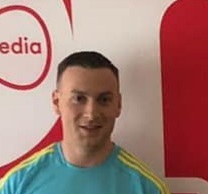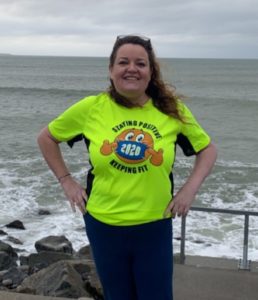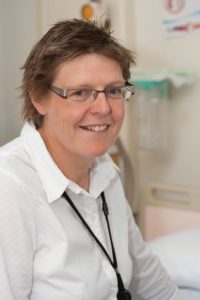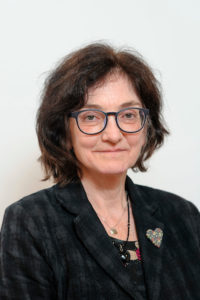Meet the Speakers
Speakers at the Irish Heart Foundation’s Stroke Conference 2021

Professor Charles Wolfe
Charles Wolfe is professor of Public Health at King’s College London. Charles’s research interests have predominantly been in the public health and health services research aspects of stroke.
He established a community based South London Stroke Register (SLSR) in 1988 that has been maintained ever since for various programmes of work. The focus of the epidemiology has been on estimating acute and longer term needs of people with stroke, the risk of stroke in a multi ethnic community and developing chronic disease register methodology.
The SLSR has been used as a sampling frame for trials of early supported discharge after stroke, secondary prevention, carer support and qualitative studies. Charles has coordinated four successive EU funded programmes assessing the quality of stroke care in Europe.
Title of talk: Long term needs of stroke survivors
Abstract
Although it is well established that stroke is a common condition with a high mortality rate, less well known are the long-term consequences of stroke.
Data from the South London Stroke Register (1988-), a Stroke Association survey of people living with stroke and findings from the international literature will be presented on long term outcomes and needs.
After 3 months the recovery patterns plateau. A third of stroke survivors’ long term (10-15 years) have reduced activities of daily living, are cognitively impaired, depressed or anxious. A survey of survivor needs identifies a different set of needs for example around employment, finances, social networks, fatigue.
The long-term impact of stroke is considerable yet the focus of stroke care delivery has been on the first few days after stroke. There now needs to be commitment to developing long term plans and increased research activity in the post- acute phase.

Professor Marion Walker
Professor Marion Walker is Emeritus Professor of Stroke Rehabilitation at the University of Nottingham in the UK and an accredited Executive Coach.
She is an occupational therapist by professional background and has played a leading role in developing a research culture within her own profession. She has served as Chair of UK Stroke Forum, President of UK Society for
Rehabilitation Research, Associate Director for Rehabilitation of the UK Stroke Research Network (2005-2015) and Associate Pro Vice Chancellor for Equality, Diversity and Inclusion at the University of Nottingham 2015-2018. Marion was a Trustee of the UK Stroke Association for 10 years (2009-2019). She is a strong advocate of patient partnership and has co-chaired the Nottingham Stroke Research Partnership Group for 10 years.
Marion is a founding member of the International Stroke Recovery and Rehabilitation Alliance and is currently leading work on the development of criteria for Centres of Clinical Excellence in Stroke Rehabilitation.
She is an Emeritus NIHR Senior Investigator and was awarded an MBE in the Queens New Year Honours’ list 2012 for her service to stroke rehabilitation and stroke survivors.
Title of talk: Moving stroke rehabilitation research into clinical practice
Abstract
All stroke patients deserve the best possible care. For many stroke survivors with residual deficits this means the provision of rehabilitation from a specialist multidisciplinary stroke team who will facilitate an optimal recovery.
Evidence-based rehabilitation is widely acknowledged to be the gold standard that we must deliver to our patients. Whilst no-one would argue with this sentiment, actually delivering what the evidence tells us is optimal care, can be hugely challenging and is certainly not a linear process. Optimal rehabilitation is more than robust knowledge from clinical research trials and Cochrane reviews; it also involves our expert clinical judgement and most importantly our patients wishes and preferences.
Unfortunately, evidence from robust research trials may not always provide the necessary information to assist rehabilitation teams on the ground to deliver optimal care. Understanding the core components of any intervention and the flexibility of the context in which it is delivered are absolutely essential.
Moving rehabilitation research evidence into practice is a complex process. This cannot be achieved unless everyone believes it is the right thing to do. Excellent communication and strong leadership are therefore essential to produce the necessary synergy required within the multidisciplinary team to ensure the best care is consistently delivered.

Professor Rónán Collins
Professor Rónán Collins MD FRCP (Lond) FRCPI FESO has been a consultant in geriatric and stroke medicine at Tallaght University Hospital (TUH) Dublin since 2005, and clinical associate professor in geriatric medicine at Trinity College Dublin since 2017. He served as Director of Stroke Services at TUH from 2005-2017, and was project lead on the inaugural Dublin mid-Leinster stroke telemedicine network. He is currently serving as the HSE National Clinical Lead in Stroke and is a Council Member of RCPI. He is also a member of the European Heart Rhythm Association’s ‘Practical guide for oral anticoagulation with NOACS in Atrial Fibrillation’ writing group. Prof Collins was co-founder of Stroke Prevention and Atrial Fibrillation Ireland (SPAFI); an interdisciplinary initiative to address atrial fibrillation and was national PI on the ENOS, TICH-2 trials, Blitz-AF and Gloria-AF registries. His clinical and research interests include stroke, atrial fibrillation, arts in health, dementia and reminiscence, and telemedicine.
Title of talk: National Stroke Programme Update

Ms Joan Mc Cormack
Ms McCormack is the Audit Manager for the Irish National Audit of Stroke (INAS) at the National Office of Clinical Audit (NOCA). Joan trained as a nurse in King’s College Hospital, London in the UK and worked in neurosurgery in Addenbrooke’s Hospital, Cambridge. She worked in the Neuroscience Directorate in Beaumont Hospital for 20 years during which she was a Clinical Nurse Manager for 12 years and a Clinical Nurse Specialist in Stroke for five. She completed a Master’s Degree in Psychotherapy from DCU in 2010. Joan project managed and co-authored the Irish Heart Foundation/HSE National Stroke Audit 2015 and was the Programme Manager for the National Stroke Programme 2016-2019.
Title of Talk: Irish National Audit of Stroke Update
Abstract
The Irish National Audit of Stroke (INAS) is a continuous national clinical audit of stroke care in Ireland. It was originally established as the National Stroke Register (NSR) by the National Stroke Programme in 2012 in partnership with the Healthcare Pricing Office. The NSR has evolved to include data collection on thrombectomy and on discipline-specific rehabilitation metrics. In 2019, governance of the NSR was transferred to the National Office of Clinical Audit (NOCA). NOCA enables the Irish healthcare system to continually improve by maintaining a portfolio of prioritised national clinical audits measured against national and international standards. By making reliable data available to those who use, manage and deliver healthcare, clinical audits help to refine Irish healthcare, improve patient outcomes, and achieve change at local and national level. NOCA works to promote an open culture of shared learning from national clinical audit in order to improve clinical outcomes and patient safety. The INAS National Report 2019 was published in December 2020 and is available here NOCA also published the COVID-19 Stroke Report issue 1 which is available here . Key findings from both reports will be presented.

Mr Shane Lee, Siel Bleu
Mr Lee teaches a regular exercise class with the Irish Heart Foundation Working Age Stroke Support Network.
This 10-minute session is designed to give a snapshot of the type of exercises that are performed with stroke patients and will incorporate elements like strength work, cardiovascular, balance and coordination and importantly how all exercises are adapted for this group.

Tammy Tallon
Tammy Tallon is a member of the Irish Heart Foundation’s Young Stroke Survivors Network. She suffered a stroke in 2018 at the age of just 40 year old. She is highly motivated and continues to make a good recovery. Tammy is a youth worker in Dublin and has returned to full time employment.
Tammy will speak about her stroke experience.

Professor Nikola Sprigg
Professor Nikola Sprigg is professor of stroke medicine at Nottingham University, and an honorary consultant physician in stroke medicine for Nottingham University HospitalsNHS Trust in the UK. Her research interests include developing treatment for haemorrhagic stroke as well as treatments to improve recovery and quality of life after stroke. Prof Sprigg was Chief Investigator of TICH-2; a phase 3 international multi-centre RCT testing tranexamic acid in intracerebral haemorrhage and DASH testing desmopressin.
Title of Talk: Management of acute Intracerebral Haemorrhage (ICH)
Abstract
Despite rapid advances in ischaemic stroke, the management of Intracerebral Haemorrhage (ICH) has not changed in the last decade, and as a result, ICH still results in high mortality and morbidity.
This talk will review recent and ongoing clinical trials in the management of ICH, focusing on acute measures to prevent haematoma expansion, by blood pressure lowering and haemostatic therapies. Bundles of care, trials of Tranexamic acid, factor VIIa and desmopressin will also be discussed.

Professor Joanna Wardlaw
Professor Joanna Wardlaw is Professor of Applied Neuroimaging and consultant neuroradiologist at the University of Edinburgh and NHS Lothian in Scotland. She has worked for many years to understand the brain and its blood supply, and on treatments to improve blood flow to the brain. She now focuses on the much more complicated problem of ‘small vessel disease’, a common cause of stroke and dementia. Prof Wardlaw and her colleagues have been instrumental in advancing understanding of the causes of small vessel disease in particular the role of the blood-brain barrier, and are now testing possible treatments. She holds a Foundation Chair and Programme in the UK Dementia Research Institute (at the University of Edinburgh Centre in the DRI), is leading the Cross-Centre Theme in Vascular Disease in the UK DRI, and led the Vascular Experimental Medicine Theme of the Dementia Platform UK (2015-2018). A Fellow of the Royal Society of Edinburgh and of the Academy of Medical Sciences, she was made a CBE for services to Medicine and Neuroscience in 2016.
Title of Talk: Updates on small vessel disease
Abstract
Small vessel disease is poorly recognised: the symptoms associated with small vessel disease, in particular that indicate worsening of brain injury, are not well understood. Recent research indicates that small vessel disease lesions can regress as well as progress. Recent insights indicate ways in which small vessel disease may damage the brain beyond ischemia that have important implications for management, prevention and treatment. The short talk will help physicians recognise symptoms associated with SVD, appreciate the variability of SVD lesions and their development or progression, and understand that dysfunction of the small vessels can damage the brain through important mechanisms other than the typical ischemia associated with stroke.

Dr Richard Perry
Dr Richard Perry did his medical training in Oxford and his PhD in Cambridge, before completing his training in neurology in London in the UK .
He worked briefly as a locum consultant at St Mary’s Hospital, Paddington, where he took the lead on setting up the stroke thrombolysis service and was appointed to the role of Clinical Lead for Hyperacute Stroke Care for the North West London Stroke Network.
Shortly after his substantive appointment as a neurology consultant at the National Hospital for Neurology and Neurosurgery in Queen Square, in 2009, he became the inaugural Clinical Lead for the Hyperacute Stroke Unit (HASU) at University College Hospital, overseeing its early development. Once that unit was up and running he headed up the hospital’s bid to become a designated NIHR Hyperacute Stroke Research Centre and moved across to become the Clinical Lead for that newly-formed centre, a post that he has held ever since.
Early on in the COVID-19 pandemic he was redeployed to spend much more time on the Hyperacute Stroke Unit. He became interested in studying the fall in stroke admissions during the pandemic (reported in the Journal of Neurology) and in the impact of COVID-19 on stroke (reported in the Journal of Neurology, Neurosurgery and Psychiatry). He has also contributed to a publication on other neurological manifestations of COVID-19 (reported in Brain). He is currently heading up a UK project to report on the neurological characteristics of cerebral venous sinus thrombosis after COVID-19 vaccination.
Title of talk: COVID-19 and Stroke
Abstract
Ever since early reports from China at the start of the COVID-19 pandemic demonstrated that the SAS-CoV-2 virus can cause a coagulopathy, stroke physicians have been concerned that this condition may be a cause of stroke, or may at least impact on its evolution and outcome. Just as the first wave of the pandemic was underway in the UK and Ireland, small case reports appeared suggesting that patients with COVID-19 and stroke tended to be much younger than other stroke patients, with more intracranial large vessel occlusions and high D-dimers, all supporting the idea that a coagulopathy may be responsible. Within a couple of months, we started to see small case-control comparisons, but in those early days the results seemed to be largely contradictory.
In his talk Prof Perry will focus mainly on the evidence that we have gathered from the SETICOS collaboration of 13 stroke centres in the UK. You will hear how our data helped to answer those early questions about whether COVID-19-associated stroke is a condition of younger people, what the radiological markers of this condition might be, whether a coagulopathy is indeed responsible and if so, through what mechanism or mechanisms.
Most of the larger studies only tell us about the impact of COVID-19 on ischaemic stroke, but Prof Perry will say a few words about his recent review of the impact of the infection on intracerebral haemorrhage, and even fewer words on the brand-new topic of cerebral venous sinus thrombosis following COVID-19 vaccination.









